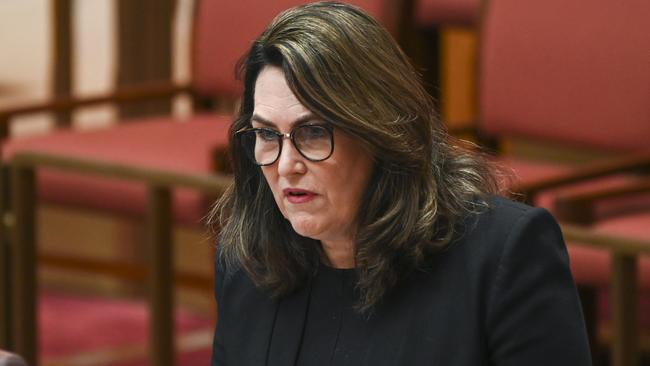
Artificial intelligence. Machine-based learning. Maybe it’ll change the world, but is it a replacement for humans?
Maybe not quite yet if we take what has gone on in recent weeks in the orbit of the Parliamentary Joint Committee on Corporations and Financial Services and its inquiry into the auditing and consultancy industry in Australia.
Chaired by Labor’s Deb O’Neill, the committee has been getting all sorts of submissions on the matter from the likes of accounting, law and management consulting firms, professional bodies, interest groups and of course, learned academics.
It’s from the latter where things haven’t gone quite to plan, with a 30-plus page document submitted by a group of smart cookies from the University of Wollongong drawing attention and creating controversy.
Alas, the scholars – Dr Erin Twyford, Professor John Dumay, Emeritus Professor James Guthrie and Professor Jane Andrew – leaned on an artificial intelligence program to assist in the preparation of their work, which has created all sorts of factual errors in the final version of the submission they sent to the parliament.
Keen eyes at financial services firm Deloitte picked up four factually incorrect statements that pinged the firm with all sorts of wrongdoing that never happened, and quickly fired off a dirty letter to the parliamentary committee highlighting the fictitious material.
“Deloitte supports academic freedom and constructive disclosure in relation to those matters currently before the committee, however it considers that it is important to have factually incorrect information corrected,” Deloitte’s general counsel Tala Bennett wrote, adding that the whole affair was “disappointing”.
Happily for us, the source of the mistakes was laid bare via the academics’ comprehensive citations for their work, which revealed the culprit to be Google Bard, the tech giant’s version of the likes of ChatGPT.
How embarrassing.
Deloitte told Margin Call it had no comment to make on the matter, while Dr Twyford blamed the whole affair on being time poor.
“The portion of the submission Deloitte is referring to was generated by an AI program and due to deadlines, we didn’t check this information thoroughly,” she told this column.
“In our response (which my co-author James Guthrie is currently drafting) we will be issuing an apology for this error and withdrawing that part of the submission.”
So much for academic activism.
Brief reprieve
Speaking of aforementioned Senator O’Neill, if things seemed a little duller at hearings this week, maybe not quite as feisty and with a less preachy, judgmental tone than avid followers are used to, it might be because the key player herself has been absent from proceedings.
Rather than front and centre in the nation’s capital, hour after hour holding the private and public sector to account, the lately high-profile Labor senator has this week been in Luanda, the capital of the southern African nation of Angola. Where else?
O’Neill has been there to attend the 147th assembly of the Inter-Parliamentary Union as part of the Australian delegation, with her seat at Wednesday’s hearing of the Economics Legislation Committee filled by the ALP’s senator for Tasmania Helen Polley, whose claim to fame of late has been the revelation to followers on TikTok that she has successfully hard boiled eggs wrapped in foil and submerged in water for decades!
On noting O’Neill’s absence yesterday, the pressed folk from the tax office and Tax Practitioners Board must have felt like they’d landed a get-out-of-jail-free card.
It’s a one-off reprieve, though, O’Neill will be back before they know it.
Diprotodon PR
A rescue mission for ancient giant wombat bones appears to have delivered China’s CITIC a significant public relations coup over billionaire Clive Palmer, amid the legal trench warfare between the two parties over control of the Sino Iron project in the Pilbara.
Last week, the WA government breathlessly announced a team from the WA Museum was recovering several rare and nearly complete diprotodon skeletons (ancient giant wombats, for those playing at home) from a site near CITIC’s mine.
CITIC’s community relations team, in turn, took full advantage of its role in helping the effort, posting pictures of the delicate operation to its social media channels complete with photos of the dig team – along with WA Culture and Arts Minister David Templeman – wearing CITIC-branded hi-vis and working beneath CITIC-branded marquees for shade. The rub? Margin Call hears that the dig wasn’t conducted on CITIC’s mining tenements at all, but on those controlled by Palmer’s private mining company, Mineralogy, which we’re told knew nothing about the operation.
To be fair, Mineralogy doesn’t actually have any actual staff operating up in the region and could never have matched CITIC’s ability to provide logistic support to the WA Museum team – such as accommodation, transport, and the host of corporate merch sported by the palaeontologist boffins on their Pilbara excursion.
And under WA law neither CITIC nor Palmer has any right to the fossils found on their mining and exploration tenements, but the PR coup by CITIC will undoubtedly raise the hackles of the Queensland businessman – who hardly needs much provocation to send in the lawyers these days.
For those who don’t remember, Mineralogy is CITIC’s landlord at Sino Iron, and the two have spent most of the last decade in close-locked legal combat about how much CITIC is supposed to pay Palmer for the right to keep running the mine. Palmer, in turn, takes about $400m a year in royalties from the operation.
Margin Call politely inquired about the matter, but there is as yet no response from Palmer as to whether he plans to make copies of the bones to add to the dinosaur park at his Coolum Resort in Queensland.
The royalties magnate is apparently still in Singapore surveying the damage to his luxury yacht, which ran aground a few weeks ago.








To join the conversation, please log in. Don't have an account? Register
Join the conversation, you are commenting as Logout